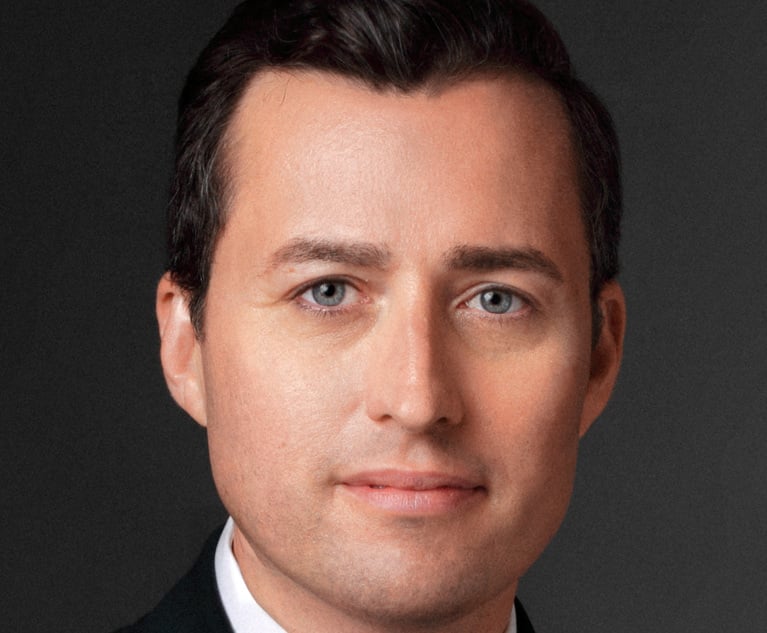Insurer Ordered to Provide $40M to Fight Lawsuits Involving Defunct RCA Capital
The ruling by a New York Supreme Court justice ordered Westchester Fire Insurance to make available up to $40 million in coverage for the former directors of bankrupt RCAP Holdings.
May 01, 2019 at 03:07 PM
5 minute read

A New York judge refused to let an insurer off the hook for providing up to $40 million in coverage for a group of former officers sued by a creditors' trust in the wake of the 2016 collapse and bankruptcy of brokerage firm RCA Capital Group LLC.
The ruling turned aside claims by Westchester Fire Insurance Co. that multiple layers of directors' and officers' coverage were barred by an “insured versus insured” exclusion that prevents a company from making up business losses caused by its own officers' and directors' actions.
There is an exception to that proviso that includes a bankruptcy trustee, receiver, liquidator or “other comparable authority.”
Westchester had argued the creditors trust was not among those exceptions because it was not “substantively independent and disinterested in the same way that a way that a bankruptcy trustee or similar entity is,” and was thus not a “comparable authority.”
But Monday's ruling by Justice O. Peter Sherwood of the New York County Supreme Court commercial division said the phrase was not defined in the policy and was “ambiguous and therefore must be construed against the insurer, particularly since it is being invoked to exclude coverage.”
Sherwood also denied Westchester's assertion that providing coverage for “intentionally dishonest, fraudulent or criminal activity” is a violation of New York public policy.
The ruling not only requires Westchester to provide its coverage, but makes available millions of dollars in additional excess coverage from other insurers who had either also denied coverage or were waiting to see how the court ruled, according to McKool Smith principal Natasha Romagnoli, who represents the former company officials along with colleagues Robin Cohen and Orrie Levy.
“As a result of this win, not only is the remaining excess coverage available but there is an additional $25 million in drop down coverage that can be used for defense costs and indemnity that otherwise would have had to be used to plug the gap created by those excess carriers denying coverage and refusing to pay,” Romagnoli said.
Westchester's attorneys, Allen Burton and Gerard Savarese of O'Melveny & Myers, did not respond to requests for comment Wednesday.
The implosion of RCAP, which in 2014 had a market capitalization of more than $1.8 billion, had already spurred multimillion-dollar litigation.
A prebankruptcy shareholders' lawuit filed in New York's Southern District ended with a $31 million settlement that exhausted RCAP's primary D&O policy and its first five layers of coverage in 2017. Westchester was not among those insurers.
That same year, the creditor's trust created by Delaware's Bankruptcy Court sued RCAP Holdings LLC and former officers and directors Nicholas Schorsch, Edward Weil Jr., William Kahane, Peter Budoko and Brian Block in Delaware Chancery Court “alleging breach of fiduciary duty to RCAP for the benefit of a different company, ARC LLC, in which the individual defendants and Block had ownership interests,” Sherwood's order said.
Block, ARC's former chief financial officer, was convicted of securities fraud and other charges in 2017, the judge noted.
Westchester, which had issued the seventh liability policy in an array of coverage totaling $75 million, filed the declaratory judgment action in New York the same day it it sent a letter denying coverage.
The individual defendants filed a competing action several days later in Delaware state court but decided to drop it and fight the coverage battle in New York where, Romagnoli said, they would be entitled to attorneys fees if they prevailed .
Other carriers that also provide excess coverage for RCAP including RSUI Indemnity—which joined the action and adopted Westchester's arguments—and Aspen American Insurance Co. and Starr Indemnity, all of whom issued letters reserving their rights to deny coverage.
The individual defendants filed counterclaims including breach of contract, breach of the covenant of good faith and declaratory judgment.
Westchester and RSUI filed motions to dismiss the counterclaims, and the individual defendants sought summary judgment on their claims.
Sherwood declined to dismiss the defendants' breach of contract claims but tossed the other two as duplicative.
Westchester and RSUI, Sherwood said, “are obligated to pay for all defense and indemnity costs incurred” in the Delaware action up to their policy limits.
“The court's decision awarding attorneys' fees underscores that carriers may not put litigation tactics above meeting their coverage obligations.” said Romagnoli via email. “In their rush to be first to the courthouse, Westchester based their denial of coverage on an overbroad reading of an exclusion that never should have been applied in these circumstances.
“Westchester now must afford the coverage they owed in the first place, as well as pay our clients' attorneys' fees as a result of Westchester's legal maneuvering,” she said.
This content has been archived. It is available through our partners, LexisNexis® and Bloomberg Law.
To view this content, please continue to their sites.
Not a Lexis Subscriber?
Subscribe Now
Not a Bloomberg Law Subscriber?
Subscribe Now
NOT FOR REPRINT
© 2025 ALM Global, LLC, All Rights Reserved. Request academic re-use from www.copyright.com. All other uses, submit a request to [email protected]. For more information visit Asset & Logo Licensing.
You Might Like
View All
Uber Files RICO Suit Against Plaintiff-Side Firms Alleging Fraudulent Injury Claims
3 minute read
Insurance Company Sues Over 180 Health Care Providers for Fraud Under RICO
3 minute read
New York Court of Appeals Tightens Pleading Standards Against Insurance Policyholder
7 minute read
Amid Growing Litigation Volume, Don't Expect UnitedHealthcare to Change Its Stripes After CEO's Killing
6 minute readTrending Stories
- 1Thursday Newspaper
- 2Public Notices/Calendars
- 3Judicial Ethics Opinion 24-117
- 4Rejuvenation of a Sharp Employer Non-Compete Tool: Delaware Supreme Court Reinvigorates the Employee Choice Doctrine
- 5Mastering Litigation in New York’s Commercial Division Part V, Leave It to the Experts: Expert Discovery in the New York Commercial Division
Who Got The Work
J. Brugh Lower of Gibbons has entered an appearance for industrial equipment supplier Devco Corporation in a pending trademark infringement lawsuit. The suit, accusing the defendant of selling knock-off Graco products, was filed Dec. 18 in New Jersey District Court by Rivkin Radler on behalf of Graco Inc. and Graco Minnesota. The case, assigned to U.S. District Judge Zahid N. Quraishi, is 3:24-cv-11294, Graco Inc. et al v. Devco Corporation.
Who Got The Work
Rebecca Maller-Stein and Kent A. Yalowitz of Arnold & Porter Kaye Scholer have entered their appearances for Hanaco Venture Capital and its executives, Lior Prosor and David Frankel, in a pending securities lawsuit. The action, filed on Dec. 24 in New York Southern District Court by Zell, Aron & Co. on behalf of Goldeneye Advisors, accuses the defendants of negligently and fraudulently managing the plaintiff's $1 million investment. The case, assigned to U.S. District Judge Vernon S. Broderick, is 1:24-cv-09918, Goldeneye Advisors, LLC v. Hanaco Venture Capital, Ltd. et al.
Who Got The Work
Attorneys from A&O Shearman has stepped in as defense counsel for Toronto-Dominion Bank and other defendants in a pending securities class action. The suit, filed Dec. 11 in New York Southern District Court by Bleichmar Fonti & Auld, accuses the defendants of concealing the bank's 'pervasive' deficiencies in regards to its compliance with the Bank Secrecy Act and the quality of its anti-money laundering controls. The case, assigned to U.S. District Judge Arun Subramanian, is 1:24-cv-09445, Gonzalez v. The Toronto-Dominion Bank et al.
Who Got The Work
Crown Castle International, a Pennsylvania company providing shared communications infrastructure, has turned to Luke D. Wolf of Gordon Rees Scully Mansukhani to fend off a pending breach-of-contract lawsuit. The court action, filed Nov. 25 in Michigan Eastern District Court by Hooper Hathaway PC on behalf of The Town Residences LLC, accuses Crown Castle of failing to transfer approximately $30,000 in utility payments from T-Mobile in breach of a roof-top lease and assignment agreement. The case, assigned to U.S. District Judge Susan K. Declercq, is 2:24-cv-13131, The Town Residences LLC v. T-Mobile US, Inc. et al.
Who Got The Work
Wilfred P. Coronato and Daniel M. Schwartz of McCarter & English have stepped in as defense counsel to Electrolux Home Products Inc. in a pending product liability lawsuit. The court action, filed Nov. 26 in New York Eastern District Court by Poulos Lopiccolo PC and Nagel Rice LLP on behalf of David Stern, alleges that the defendant's refrigerators’ drawers and shelving repeatedly break and fall apart within months after purchase. The case, assigned to U.S. District Judge Joan M. Azrack, is 2:24-cv-08204, Stern v. Electrolux Home Products, Inc.
Featured Firms
Law Offices of Gary Martin Hays & Associates, P.C.
(470) 294-1674
Law Offices of Mark E. Salomone
(857) 444-6468
Smith & Hassler
(713) 739-1250






